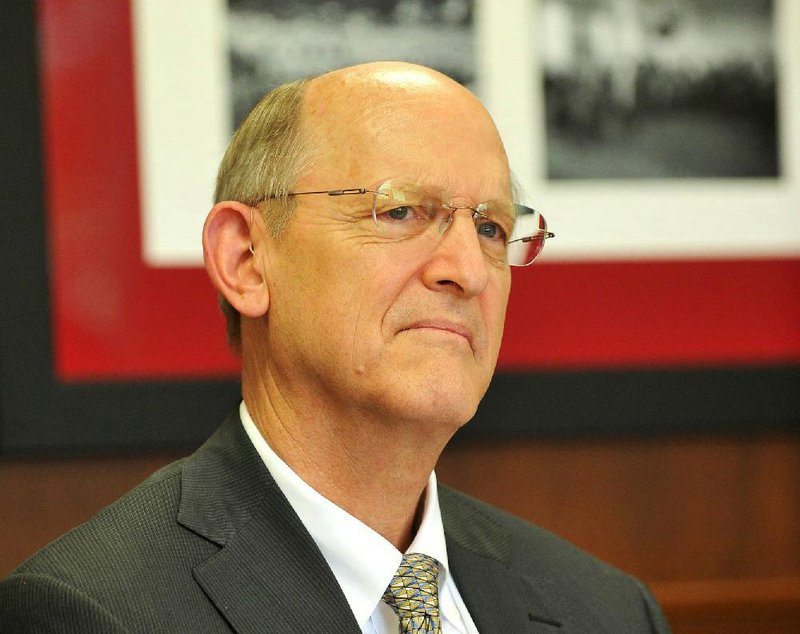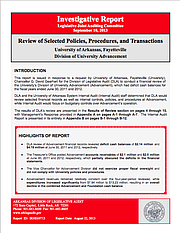For nine months, University of Arkansas at Fayetteville Chancellor G. David Gearhart has focused blame for millions of dollars in overspending by the school’s fundraising division on two former employees - division chief Brad Choate and his budget officer, Joy Sharp.
Now a state audit report released Tuesday provides the first public inquiries into actions by the university’s highest-ranking finance officials and their offices - Associate Vice Chancellor and Treasurer Jean Schook and Vice Chancellor for Finance and Administration Don Pederson.
RELATED ARTICLES
http://www.arkansas…">Fraud line a privacy threat, suspend it, UA auditor sayshttp://www.arkansas…">Lack of records hinders UA probe, reports say
The audit report includes allegations of questionable or incorrect accounting, failure to provide written budget policies and procedures,and approval of an improper relationship for handling financial transactions between Sharp and her sister, also a university employee.
The report claims that Schook’s office posted questionable “accounts receivables,” which partially obscured deficits in the fundraising division’s financial statements. Auditors sent that information to Washington County prosecutor John Threet in a Monday letter concerning possible violations of state law.
The audit also focuses on an Oct. 25 meeting between Pederson, Schook and auditors at which auditors say Pederson and Schook didn’t disclose pertinent information. That information related to possible fraud in connection with the University Advancement Division’s overspending, the audit says.
The university’s “management response to report,” a 10-page document included with the audit, argues that the “accounts receivables” entries were proper.
The response also disputes any failure by Pederson or Schook to disclose pertinent information, saying they knew of “no allegation of fraud or suspected fraud.”
The university’s management response was written by financial affairs staff members and approved by Pederson, school officials said.
Schook, Pederson and Pederson’s boss, Gearhart, were meeting with university trustees Thursday. Schook and Pederson answered some Arkansas Democrat-Gazette questions in a brief telephone interview.
Two top state auditors who signed the report-Legislative Auditor Roger Norman and University of Arkansas System internal audit director Jacob Flournoy - declined to comment on their findings until the report is presented at 9 a.m. today to the Legislative Joint Auditing Committee in a meeting in Little Rock in Room A of the Multi-Agency Complex (Big MAC Building).
University of Arkansas System trustees have scheduled a meeting to discuss the audit report at 8 a.m. Saturday in the H.L. Hembree Room (No. 203) of Willard J. Walker Hall at the University of Arkansas at Fayetteville.
Pederson answers directly to Gearhart and has been the school’s top financial officer for 15 years. He and Gearhart also oversee $36.8 million in reserve funds, including $19 million in unappropriated reserves, according to the audit. The money is available for university spending and savings, “at the discretion” of Pederson and Gearhart, the audit says.
Pederson’s annual salary and fringe benefits total $387,845 this year, according to a university spokesman.
Schook, a veteran auditor, was hired as the university’s associate vice chancellor/ treasurer in 2007 . Her salary and benefits this year total $209,916.
The Advancement Division’s fiscal 2012 deficit was discovered July 6 last year. That’s when the University of Arkansas Foundation delayed a $225,000 funds transfer request from Sharp “due to a lack of availability of funds.” The money was meant to pay deferred compensation for Gearhart.
The deficit became public in a Dec. 3 announcement from Gearhart, which said the division overspent its budget by more than $3 million. Gearhart, who headed the fundraising division until 2008, said Choate and Sharp had been reassigned. The chancellor said the division had been “miscalculating the funding levels” needed to support new hires and used “anticipated investment revenues to meet current budget obligations.”
He said that the overspending was used for legitimate university needs and that officials found no fraud.
After questions about the overspending continued, Gearhart in February called in state auditors.
That report, released Tuesday, said that the Advancement Division’s deficit was actually $4.19 million in 2012, not $3.37 million as university officials have maintained since early this year. The audit listed a $2.14 million deficit for the division in 2011.
In a media briefing Tuesday after the audit’s release, Gearhart reiterated that the Advancement Division’s budget shortfall was caused by two employees, Choate and Sharp, who didn’t monitor the budget or understand the division’s complicated funding.
The division, responsible for raising funds for university endeavors, gets most of its operating funds from two sources:
Its share of state aid, tuition and fees, which amounted to $4.7 million in the fiscal 2012 budget.
The UA Foundation, a nonprofit that funds a variety of university activities, including the Advancement Division. The foundation’s share of the division’s 2012 budget was $6.1 million, according to the audit.
The rest of the division’s 2012 budget of $11.4 million came from other revenue ($499,052) and a transfer from the discretionary funds controlled by Pederson and Gearhart ($1.4 million), according to the audit.
The audit report by the Legislative Audit Division and the University of Arkansas System echoed Gearhart in its criticism of the two former employees. It cited Choate for “lack of fiscal oversight” of Advancement Division spending and provided examples. The audit criticized Sharp for “inadequate and incorrect accounting and reporting,” with examples.
The audit report released Tuesday also contains at least a dozen notations critical of Schook, Pederson or their offices.
Choate responded Tuesday that he believes the audit report shows “a lack of institutional financial control across the entire university … .” Sharp could not be reached for comment.
FAILURE TO DISCLOSE
Auditors and university administrators disagree about whether Pederson and Schook should have disclosed any suspected fraud in the fundraising division’s deficit during the Oct. 25 meeting with auditors, the audit report shows.
Pederson signed a “management representation letter” that day for the 2012 fiscal year audit. According to Tuesday’s audit report, that letter regarding the university budget included this statement: “We have no knowledge of any allegations of fraud or suspected fraud … .”
But a few days before that meeting, in a report dated Oct. 19 about the Advancement Division’s budget shortfall, Schook wrote: “Many fraud risk factors were identified … .”
Schook’s October report went on to say: “… no evidence of intentional acts to misappropriate resources forpersonal gain have been discovered. It should be noted that a review of accounting records specifically to identify misappropriated resources has not been performed … .”
Regarding Schook’s report and the failure to mention it in the Oct. 25 meeting, auditors wrote: “… University management should disclose to auditors information pertinent to matters referenced in the management representation letter.”
University officials say Pederson and Schook did not withhold pertinent information as outlined by the management representation letter.
“We had already concluded no fraud took place,”Pederson said Thursday. “Identifying fraud risks and suspecting fraud are two different things.”
IMPROPER PROXY
Longtime advancement budget director Joy Sharp assigned “proxy for approval of transactions” to her sister Betty Sharp, also a university employee, the audit said.
“As a result, numerous transactions (a combined total of more than 200 in 2011 and 2012) involved a request by the budget director and approval by her sister, which conflicts with sound accounting practices.”
Auditors went on to say: “The treasurer’s office approved this proxy arrangement.”
In an email Thursday, Schook wrote: “The proxy request was granted because Betty met the criteria established by policy to approve transactions” below specified monetary thresholds.
Schook’s Oct. 19 report did address the issue of a “conflict of interest” between the Sharp sisters, part of a paragraph saying Choate “did not exercise proper oversight over the activities of the division… .”
The treasurer’s report says: “a review … revealed many transactions that only involved [Joy Sharp] and a family member … When these transactions were presented to [Choate], he could not explain why only these two staff members were involved in transactions that did not appear to be within duty scope of the family member.”
Schook’s report included no mention of who, if anyone, approved the proxy relationship.
The UA System internal auditor’s portion of the audit released this week says the proxy assignment violated “UA Board Policy 410.1 Nepotism.”
‘ACCOUNTS RECEIVABLES’ QUESTIONS
In a letter to Washington County Prosecutor John Threet on Monday, Legislative Auditor Roger Norman said Schook’s office posted “accounts receivables” that “partially obscured the deficits” in the Advancement Division’s financial statements for 2011 and 2012.
The report cited the accounting entry to the prosecutor for review under Ark. Code Annotated 10-4-419(c) (1). That statute says: “The Legislative Auditor shall notify and cooperate with the appropriate prosecuting attorney on all matters that appear to involve a criminal offense.”
The audit report shows Schook’s office posted one account receivable, which is a debt the university expects to collect, of $2.09 million in June 2011 to the fundraising division’s budget. The second receivable was for $2.45 million in June, 2012, also for the fundraising arm, the audit said.
Both accounts receivable were reversed or removed a month later “without verification that funds had been received,” auditors wrote in their letter to the prosecutor.
The legislative auditor’s office also found a third receivable for the fundraising division posted for June 3 this year, for $3.2 million, according to the letter to Threet.
UA-Fayetteville’s management response to the audit said the accounts-receivable entries met general accounting standards that apply to universities that receive state funding.
“We believe there have been misunderstandings of what those standards are for a university that gets state funding,” Pederson said.
MORE ISSUES
Schook’s office “did not comply with generally accepted accounting principles because the University’s financial statements for 2009 through 2012 did not disclose two of three outstanding loans that Advancement owed the Foundation.”
Those loans ranged as high as $1.5 million on June 30, 2009, to a low of $382,288 on June 30, 2012, the audit said.
University management responded that the two loans not disclosed involved “unrestricted private funds that were received and on deposit in [University] Foundation accounts.”
“The two loans were never on our books,” Pederson said. “We did report the one that was on our books.”
Pederson’s office was criticized for not providing the colleges and divisions with written instructions on how to effectively monitor the budget process. Auditors said written instructions should be developed. Management responded by agreeing to do so by June 30, 2014.
The Finance and Administration office also “did not monitor college and division accounts in a deficit position until May of each year,” about a month before the university’s fiscal year ends on June 30. Management agreed to develop new policies to better monitor financial concerns.
Pederson “informed us that unappropriated reserves [more than $19 million this year] are not budgeted,” auditors wrote.
“Requests for funding from the reserves are made by the college or division’s management” to Pederson, who makes the final decisions, the audit report says.
Requests are approved in consultation with Gearhart “for any questionable items,” auditors wrote.
Auditors said management should budget all funds related to the university. Management agreed.
Pederson also informed auditors “that a written plan approved by the Chancellor and Board of Trustees to address deficits does not exist.”
Their report said Pederson later suggested listing these deficits as internal loans.
“We could not locate a university policy on establishing internal loans,” the report added.
In its response, the university said: “At such time that a formal internal loan process is developed on the campus, a policy will be recommended to the Board of Trustees that will allow the establishment of internal loans … Feasibility and need will be assessed during FY14.”s
Front Section, Pages 1 on 09/13/2013

